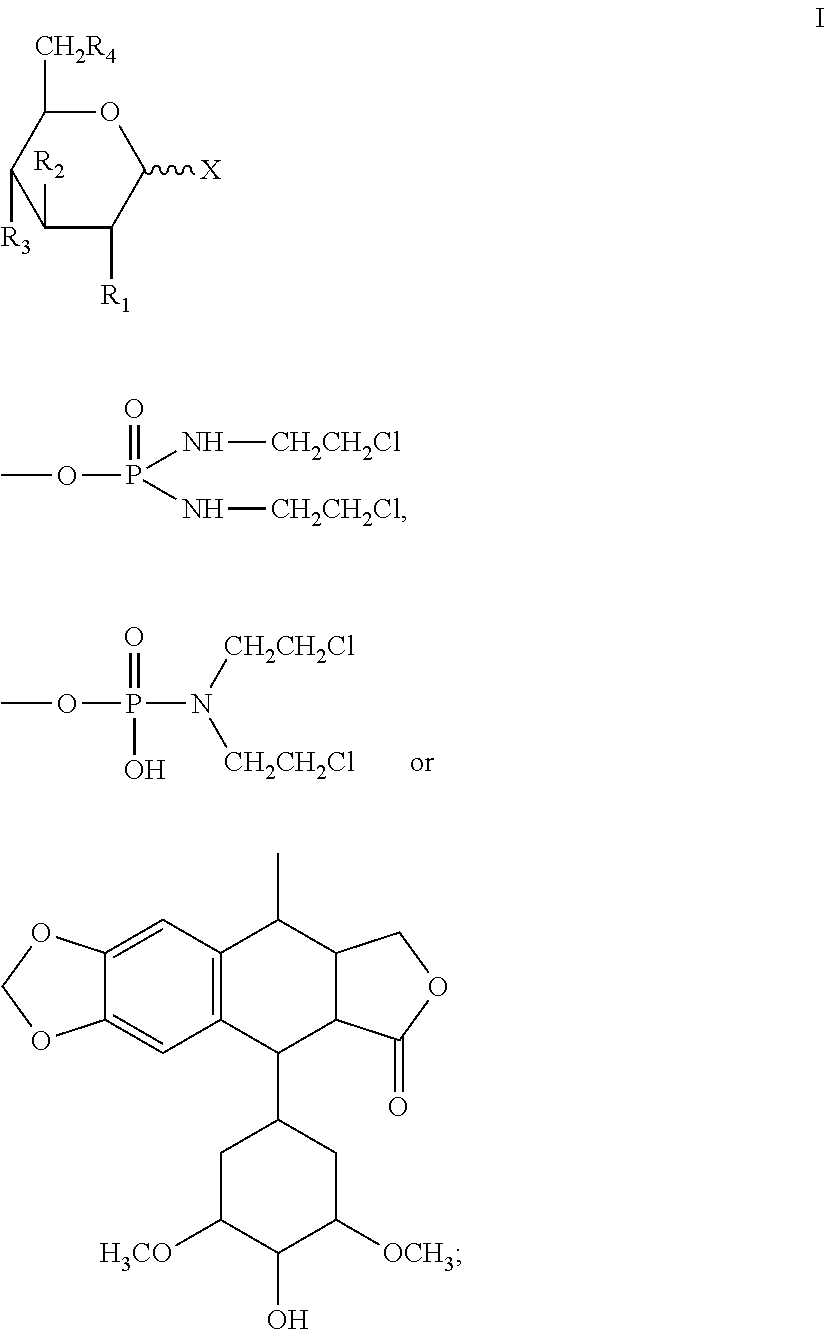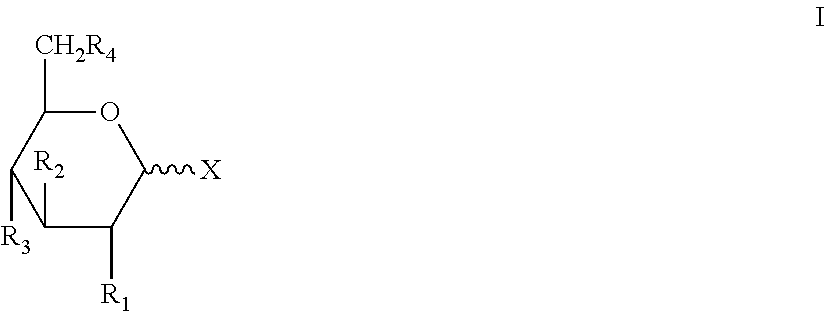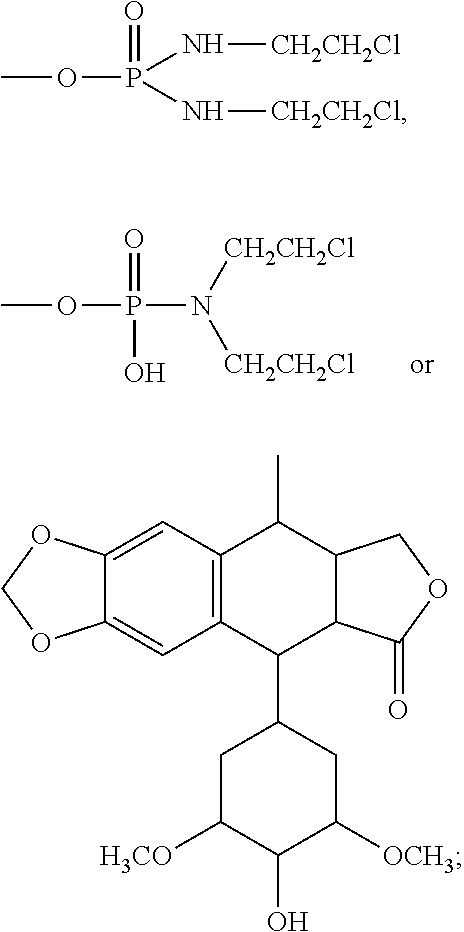Halogenated dideoxy sugar derivates, preparation method and application thereof
a technology of halogenated dideoxy and sugar, applied in the field of pharmaceutical chemistry, can solve the problems that pure 2-deoxyglucose does not possess a very strong anti-tumor effect, and achieves the effects of strong cytostatic effect, easy crystallization, and no energy consumption
- Summary
- Abstract
- Description
- Claims
- Application Information
AI Technical Summary
Benefits of technology
Problems solved by technology
Method used
Image
Examples
example 1
Preparation of Compounds 1 and 2
[0070]Take 10 g of 2-deoxy glucose and 85 ml acetic anhydride. First add 85 ml acetic anhydride into the reactor and control the temperature at 20° C. Then add 2-dedoxy glucose and the temperature shall not exceed 30° C. Stir the reaction mixture for 3 hours. Use chloroform for extraction and crystallize to obtain 13.8 g pure tetraacetate-2-deoxy glucose.
[0071]Take 10 g tetraacetate-2-deoxy glucose, and 0.088 mol HBr gas. First add CH2Cl2 and tetraacetate-2-deoxy glucose into the sealed reactor. After tetraacetate-2-deoxy glucose is completely dissolved under 25° C., add HBr into the mixture and increase the pressure (0.7 kPa) and stir the mixture for 15 hours. After purification and crystallization, 8.3 g tri-acetate-2-deoxy glucose bromide is obtained.
[0072]Silica gel chromatography is used to separate α, β two configurations. Use dichloromethane: methane=80:20 eluant to separate α, β two configurations. 2.4 g α compound (compound 1) and 3.2 g β com...
example 2
Preparation of Compounds 3 and 4
[0076]Take 10 g of 3-deoxy glucose and 85 ml acetic anhydride. First add 85 ml acetic anhydride into the reactor and control the temperature at 15° C. Then add 3-dedoxy glucose and the temperature shall not exceed 25° C. Stir the reaction mixture for 4 hours. Use chloroform for extraction and crystallize to obtain 11.3 g pure tetraacetate-2-deoxy glucose.
[0077]Take 10 g tetraacetate-3-deoxy glucose, and 0.088 mol HBr gas. First add CH2Cl2 and tetraacetate-3-deoxy glucose into the sealed reactor. After tetraacetate-2-deoxy glucose is completely dissolved under 20° C., add HBr into the mixture and increase the pressure (0.8 kPa) and stir the mixture for 15 hours. After purification and crystallization, 7.8 g tri-acetate-2-deoxy glucose bromide is obtained.
[0078]Silica gel chromatography is used to separate α, β two configurations. Use dichloromethane: methane=80:20 eluant to separate α, β two configurations. 2.7 g α compound (compound 3) and 2.3 g β com...
example 3
Preparation of Compounds 5, 6
[0082]Take 10 g triacetate-2-deoxy glucose bromide and compound X1 14 g. In the reactor, first add tetrahydrofuran, dichlormethane (V / V=1:2), and then add compound X1. After the compound is completely dissolved, CuSO4 is added. Triacetate-2-deoxy glucose bromide is dissolved in dichloromethane and is added dropwise into the reactor. The temperature is controlled at 30° C. The mixture is stirred for 8 hours. After the reaction is over, distilled water is used to wash the compounds for 3-5 times. Methane is used for crystallization and 4.7 g crystals are obtained. Silica gel chromatography is used to separate α, β two configurations. Use acetyl acetate: methane=70:30 eluant to separate α, β two configurations. 1.5 g α compound (compound 5) and 2.1 g β compound (compound 6) are obtained.
[0083]Compound 5: melting point=119° C.-120° C., optical rotation=+144°
[0084]Compound 6: melting point=108° C.-110° C., optical rotation=−121°
[0085]Element Analysis:
compound...
PUM
| Property | Measurement | Unit |
|---|---|---|
| volume | aaaaa | aaaaa |
| flow rate | aaaaa | aaaaa |
| pressure | aaaaa | aaaaa |
Abstract
Description
Claims
Application Information
 Login to View More
Login to View More - R&D
- Intellectual Property
- Life Sciences
- Materials
- Tech Scout
- Unparalleled Data Quality
- Higher Quality Content
- 60% Fewer Hallucinations
Browse by: Latest US Patents, China's latest patents, Technical Efficacy Thesaurus, Application Domain, Technology Topic, Popular Technical Reports.
© 2025 PatSnap. All rights reserved.Legal|Privacy policy|Modern Slavery Act Transparency Statement|Sitemap|About US| Contact US: help@patsnap.com



